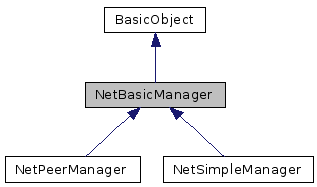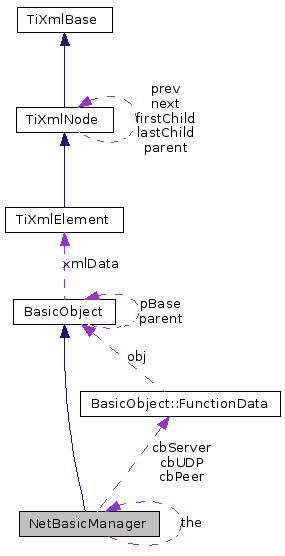
#include <netmanager.h>
Inheritance diagram for NetBasicManager:


Public Member Functions | |
| DECLSPEC | NetBasicManager (const char *name, BasicObject *p) |
| DECLSPEC | NetBasicManager (TiXmlElement *el, BasicObject *p) |
| DECLSPEC bool | init (unsigned int port=NETWORK_PORT, unsigned int udpport=NETWORK_UDPPORT, int udpmaxsize=1024) |
| void | destroy () |
| DECLSPEC unsigned int | send (char *data, int size) |
| DECLSPEC bool | sendUDP (char *data, int size, const IPaddress &ip) |
| virtual DECLSPEC bool | checkPeers () |
| virtual DECLSPEC bool | checkServer () |
| DECLSPEC NetSocket * | getSocket (const IPaddress &ip) |
| DECLSPEC void | deleteDisconnected () |
| int | numConnections () |
| void | setConnectCallback (BasicObject::Callback func, BasicObject *pData) |
| void | setPeerCallback (BasicObject::Callback func, BasicObject *pData) |
| void | setUDPCallback (BasicObject::Callback func, BasicObject *pData) |
| int | localPort () |
| DECLSPEC const char * | localIP () |
| |
Static Public Member Functions | |
| static DECLSPEC bool | initSDL () |
| static DECLSPEC void | quitSDL () |
Static Public Attributes | |
| static NetBasicManager * | the |
Protected Member Functions | |
| virtual DECLSPEC void | onInit () |
| virtual DECLSPEC void | onDestroy () |
| virtual DECLSPEC void | onReceiveUDP (UDPpacket *udp) |
| virtual NetSocket * | createSocket (TCPsocket socket)=0 |
Static Protected Member Functions | |
| static DECLSPEC NetBasicManager * | getThe () |
Protected Attributes | |
| bool | bInited |
| int | nListenPort |
| unsigned int | nUDPPort |
Friends | |
| class | NetSocket |
To use network, initialize a derived class from this, because NetBasicManager contains virtual prototype functions.
Every network managing class works closely together with a socket class, which has to be derived from NetSocket. All Sockets have to be children of a class derived from NetBasicManager and all children of a NetBasicManager have to be NetSocket objects.
Similar to the creation of GuiElements via XML-file, it is possible to create NetSockets by XML-data, if the concerning NetSocket-derived class has a valid slot registered for creating it. In comparison to the Gui-objects, the sockets have to be direct children of the Net*Manager and they have to be compatible to the Net*Manager (i.e. NetStandardSocket must not be a child of NetPeerManager)
UDP
The NetBasicManager will always (try to) initialize UDP. But if UDP cannot be initialized, the init() method will return true though (provided that TCP could be set up). The reason for this is, that UDP is a protocol, that cannot guarantee that packet reach the destination host. So UDP not initialized is equal to loosing all packets.
This class must not be used in two variables at a time.
| bool NetBasicManager::init | ( | unsigned int | port = NETWORK_PORT, |
|
| unsigned int | udpport = NETWORK_UDPPORT, |
|||
| int | udpmaxsize = 1024 | |||
| ) |
Initializes the network manager. If you do not use the constructor NetBasicManager(TiXmlElement *, BasicObject *) calling this is neccessary before using further network functions.
| port | port number on which to listen for connections or zero, if it should only work as client and does not need server abilities If you do not specify a param, the default netrinjo network port will be used, as defined in NETWORK_PORT. | |
| udpport | the port number on which to send/receive UDP packets. This must be <port>+1 when using UDP with NetSockets! If zero, the port number is chosen by the system. | |
| udpmaxsize | the maximum size (in bytes), an incomming UDP packet must not exceed. |
| void NetBasicManager::destroy | ( | ) | [inline] |
Uninitializes the network manager. Call this before closing the app.
Reimplemented from BasicObject.
| unsigned int NetBasicManager::send | ( | char * | data, | |
| int | size | |||
| ) |
Sends data to all connected hosts by calling sendData(data,size) of all sockets.
| data | a pointer to the data to be sent | |
| size | the size (in bytes) of the data to be sent |
| bool NetBasicManager::sendUDP | ( | char * | data, | |
| int | size, | |||
| const IPaddress & | ip | |||
| ) |
Sends data via UDP to the specified host.
| data | the data to send | |
| size | the size of the data (in bytes) | |
| ip | the destination IP-address |
| bool NetBasicManager::checkPeers | ( | ) | [virtual] |
Checks all connections, whether there was an incomming message and, if so, the callback function will be called on every message.
This function should be called regularly to be able to act on the messages.
| bool NetBasicManager::checkServer | ( | ) | [virtual] |
Checks on incomming connection requests. If someone wants to connect, the callback function will be called. There is only one new connection possible per checkServer-call.
This function should be called regularly to be able to act on connection requests.
| NetSocket * NetBasicManager::getSocket | ( | const IPaddress & | ip | ) |
| ip | the address of the socket to return (its port can be set to zero in order to ignore it) |
| void NetBasicManager::deleteDisconnected | ( | ) |
Deletes all disconnected sockets and removes them from the manager's socket list.
| int NetBasicManager::numConnections | ( | ) | [inline] |
| void NetBasicManager::setConnectCallback | ( | BasicObject::Callback | func, | |
| BasicObject * | pData | |||
| ) | [inline] |
Sets the callback function, that is called, when a connection request is comming in
| func | the function to call | |
| pData | a pointer to data, that should be sent to the callback as 2nd param |
| void NetBasicManager::setPeerCallback | ( | BasicObject::Callback | func, | |
| BasicObject * | pData | |||
| ) | [inline] |
Sets the default callback function, that is called, when a socket receives data.
| func | the function to call | |
| pData | a pointer to data, that should be sent to the callback as 2nd param |
| void NetBasicManager::setUDPCallback | ( | BasicObject::Callback | func, | |
| BasicObject * | pData | |||
| ) | [inline] |
Sets the default callback function, that is called, when the UDP socket receives data.
| func | the function to call | |
| pData | a pointer to data, that should be sent to the callback as 2nd param |
| int NetBasicManager::localPort | ( | ) | [inline] |
| const char * NetBasicManager::localIP | ( | ) |
xxx.xxx.xxx.xxx
| bool NetBasicManager::initSDL | ( | ) | [static] |
Initialises SDL-networking, by calling SDLNet_Init() - if not done already. If initialisation succedes, or if it was already done, the reference counter is increased.
| void NetBasicManager::quitSDL | ( | ) | [static] |
Decreases the reference counter and uninitialises SDL-networking, if it becomes zero by calling SDLNet_Quit().
| NetBasicManager * NetBasicManager::getThe | ( | ) | [static, protected] |
This function is protected, so use the getThe function of the derived class that was inited.
Reimplemented in NetSimpleManager, and NetPeerManager.
| void NetBasicManager::onInit | ( | ) | [protected, virtual] |
Initializes the object's variables by reading data from the XML element. If there were no XML data used for creation, nothing is done. This function calls onInit() of its children recursively (after it has inited itself). It is highly recommended to call BasicObject::onInit(), usually at the end of the onInit() method, when overwriting it in a derived class.
Reimplemented from BasicObject.
Reimplemented in NetPeerManager.
| void NetBasicManager::onDestroy | ( | ) | [protected, virtual] |
May be called to reinitialise this object or stop an initialised module. Calls all children's onDestroy(). Most classes do not use this method. But sometimes it is useful to reset the functionality of an object.
Reimplemented from BasicObject.
| void NetBasicManager::onReceiveUDP | ( | UDPpacket * | udp | ) | [protected, virtual] |
Called after a UDP packet has been received.
NetBasicManager::onReceiveUDP() looks for a NetSocket, that uses the same address (IP + port) as the packet's source is and calls its onReceiveUDP() method.
| udp | the received packet (the content will be overwritten when receiving the next packet) |
| virtual NetSocket* NetBasicManager::createSocket | ( | TCPsocket | socket | ) | [protected, pure virtual] |
Creates a class, derived from NetSocket, that is compatible to the managing class.
| socket | the SDL-TCP socket which is used by the new NetSocket |
Implemented in NetSimpleManager, and NetPeerManager.
NetBasicManager * NetBasicManager::the [static] |
only accessible in Linux, and equals the result of getThe()
bool NetBasicManager::bInited [protected] |
Signals, whether the manager has been inited.
int NetBasicManager::nListenPort [protected] |
Contains the TCP port number on which the manager listens for connection requests. It is zero, if it does not work as server.
unsigned int NetBasicManager::nUDPPort [protected] |
The port on which is listened for UDP data, if zero the port is unknown
 1.5.1
1.5.1